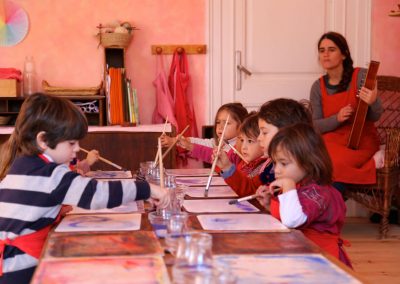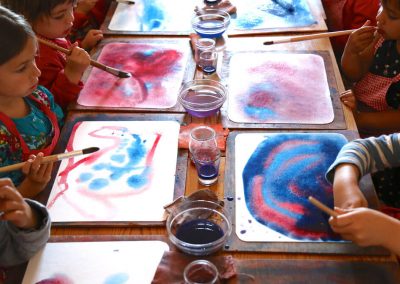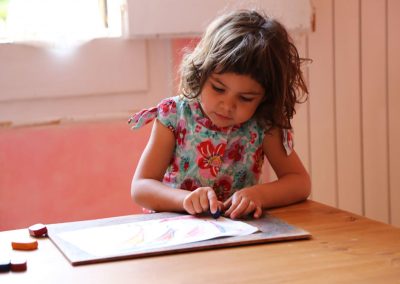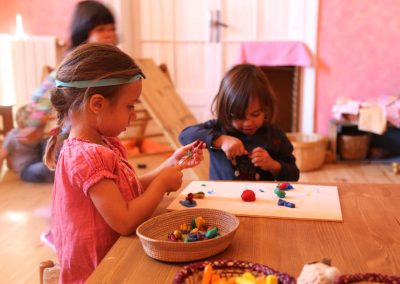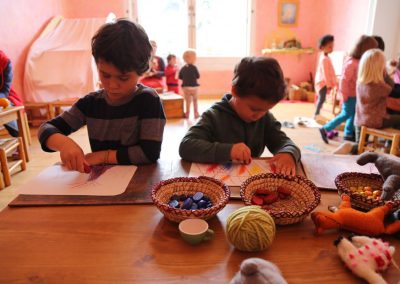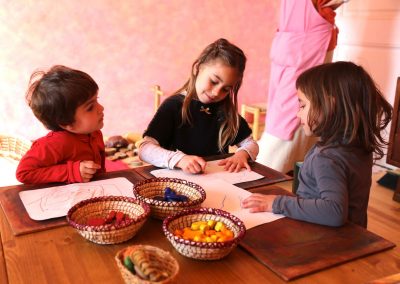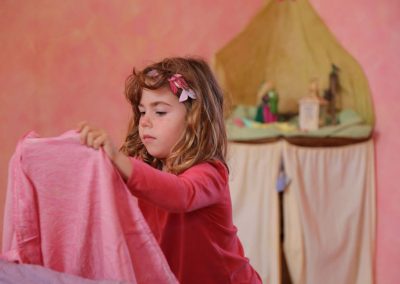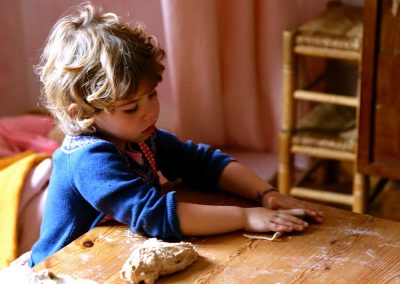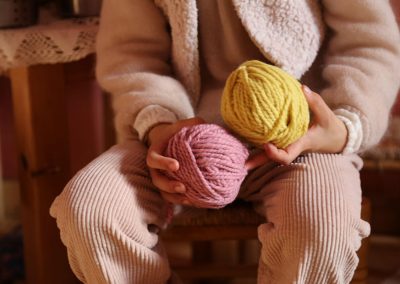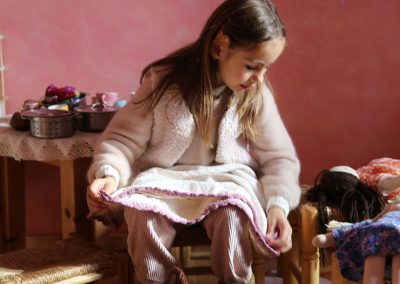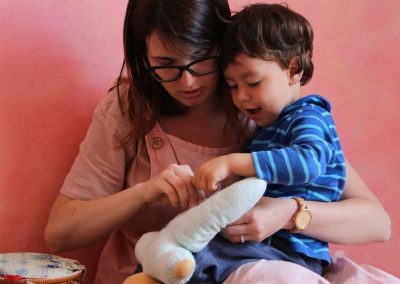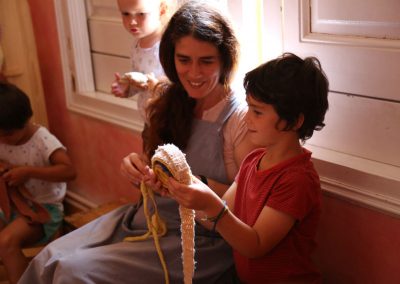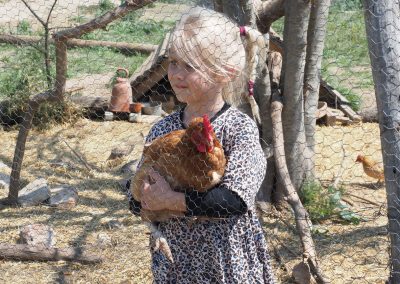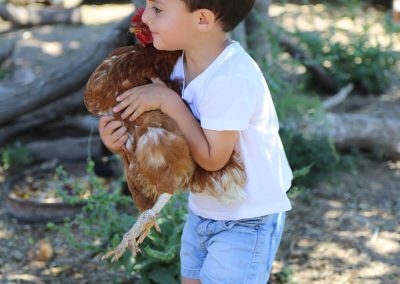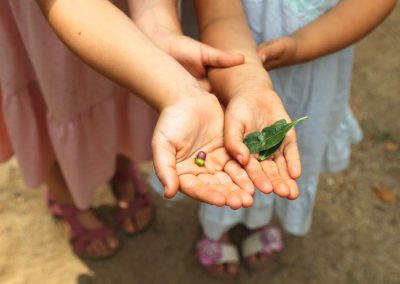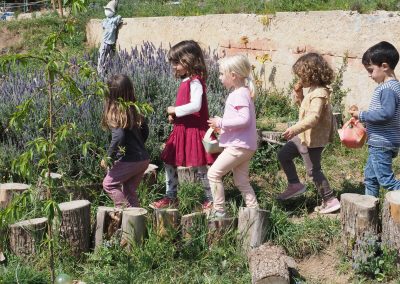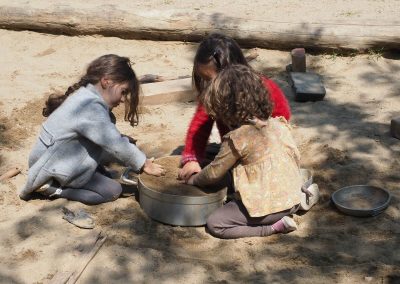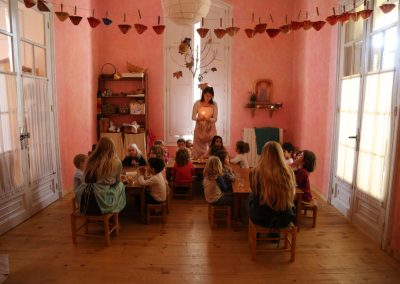Waldorf Krisol Playgroup
The Playgroup Krisol Waldorf is a space made up of children between 3 and 6 years old. In this vital stage, the objectives of the Waldorf pedagogy focus on developing children’s senses through imitation and experimentation of community life marked by rhythm, in an environment that is respectful of others and the world that surrounds them.
Currently the Krisol Playgroup is made up of two groups, Arç and Roure, of approximately twenty children in each and without separation by age, thus favoring coexistence and mutual help between the children. The teacher, accompanied by an assistant and a volunteer, is dedicated to offering children a homely, safe, natural environment and an orderly dynamic in time and space, which gives them the security and confidence to express themselves in free play.
In this first stage, from 0 to 7 years old, the children find themselves in the fundamental task of building their house, their own body; they are shaping their internal organs and also developing the senses that are linked to this physical development: the touch sense, the vital sense, the sense of own movement and the sense of balance.
From this perspective, it is essential to preserve the essence of each child, without the interference of learning that which does not correspond to their maturational level, and that will allow an integral and harmonious development in each individual.
To encourage these senses to develop healthily, the environment of a Waldorf school takes great care of the atmosphere, the materials (all of natural origin), colours, sounds, shapes and textures. In addition the children experience hands-on activities and games, contact with nature, all of which allow these senses to be stimulated appropriately.
Young children basically learn by imitation; They identify with the environment that surrounds them and put all their will into imitating the adults that are within their reach. That is why in the Waldorf pedagogy the child is provided with an environment in which the adult is always doing meaningful activities that are worthy of being imitated, such as taking care of the garden or vegetable patch, doing domestic tasks such as sweeping, sewing , make bread, etc.
The main activity of children is to play, in the Waldorf pedagogy play is cultivated as a fundamental element of learning. Playing means being in a creative process. When children play they are continually creating and recreating scenes from everyday life and integrating them into their development.
All these elements are a way to care for and strengthen both the physical and emotional health of children, as well as to allow a better approach to learning and development before beginning the thought processes of a primary classroom.
TIMETABLE
The Playgroup opens the doors to welcome the children in a flexible schedule from 09:00 to 09:30 in the morning. Upon arrival, the children leave fruit in a basket in the entrance, which they will share at mid-morning with the rest of their classmates. Next, in the hall they change their shoes and enter the play space with their slippers on, where they are received warmly by the teachers. The pick-up of children is also done in a flexible manner, from 12.30 to 13.15.
RHYTHM
Rhythm and repetition give children confidence and security to develop their full potential. The fact that activities are repeated day after day, the stories, the songs; week to week, artistic activities; and, annually, the celebration of rituals, such as festivals and the changing of the seasons, provide the child with a structure within which he or she can grow with confidence.
Free play is complimented daily with simple and natural materials as the main activity, and also group activities such as drawing with water colours, making bread or eurythmy, which take place in the classroom and are repeated on a weekly basis.
During breakfast the fruit is shared that the children have brought from home and the bread that they have made themselves, and then they go out to play in the garden, even on rainy days, where the children enjoy themselves in the sandpit, with the wheelbarrows, the fig tree, the chickens, the vegetable patch …
Before leaving, the children listen to a story again in the classroom, alternating more expansive activities with others that favor calmness. The stories told by the teachers, often represented with a table theater and the sound of the lyre, accompany the seasons and the annual festivities.
TEACHING FACULTY
Carolina Torrecilla Macho – Roure Teacher
Ester Serracarabasa Moreno – Roure Assistant Teacher
Marina Robert Hernández – Arç Teacher
Gabriela Bernal Maldonado – Arç Assistant Teacher
PROFESSIONALS
María Romo Arroba – Eurythmist
Pilar De Juana Aiza – “Bona Tarda” Service Companion
VOLUNTARIAT FREUNDE
Justus Herzig
Pauline Lieschke
SERVICES
Ideally at this stage the appropriate home time for the children is 13.15, however the Playgroup has an accompanying service at lunchtime for those families who need it. It is a space self-managed by the families from 13:15 to 14:00 and an afternoon session until 16:00.

